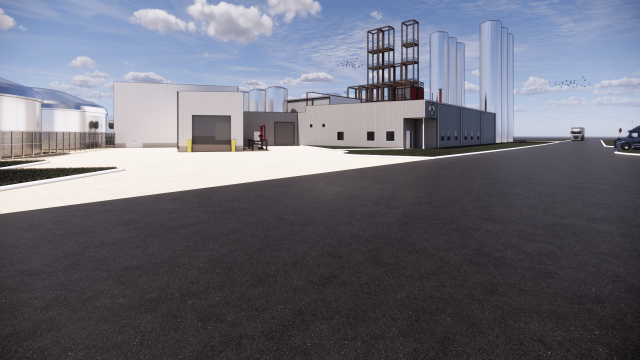This website uses cookies so that we can provide you with the best user experience possible. Cookie information is stored in your browser and performs functions such as recognising you when you return to our website and helping our team to understand which sections of the website you find most interesting and useful.
Canadian distillery converts cow’s milk into booze to fly planes
Dairy Distillery in Ontario, the maker of Vodkow vodka, is now creating sustainable aviation fuel by converting milk into alcohol.

The distillery, run by CEO Omid McDonald, produces a carbon neutral vodka from unused lactose. During dairy processing, the sugar in milk (lactose) is separated from the fats and proteins. This byproduct, known as milk permeate, is often discarded or used for animal feed, but Canada’s Dairy Distillery has found another use for it — making booze.
McDonald argues that with people drinking less milk but eating more cheese and yogurt, excess lactose is a growing problem. Dairy Distillery therefore found a natural yeast that converts lactose into alcohol, that it now uses to make Vodkow vodka. The company also produces a range of Vodkow cream liqueurs using fresh Canadian cream.
It has now created the Dairy Distillery Alliance, working with the Michigan Milk Producers Association (MMPA) to build a US$41 million alcohol plant in Constantine, Michigan.

The new facility will transform 14,000 tons of milk permeate, dairy’s byproduct, into 2.2 million gallons of alcohol each year. Those behind the project claim that when blended with transport fuel, the alcohol will offset 14,500 tons of carbon a year, providing sustainable aviation fuel to powering planes.
McDonald said of the project: “Utilising milk permeate to produce low carbon ethanol is an innovative solution to reduce carbon footprint and provide dairy farmers more value from their milk.”
MMPA president and CEO Joe Diglio added: “The Dairy Distillery Alliance marks a significant step forward in our sustainability journey. By transforming milk permeate into ethanol, we are not only reducing waste but also contributing to a cleaner environment.”

This is not the first time that alcohol made from cow’s milk has been used to power engines. During the oil crisis in the 1970s, ethanol plants in the US were built to convert whey into fuel. However, many of these plants were decommissioned once the crisis subsided.
UK monarch Charles III also runs his prized Aston Martin on wine and cheese byproducts. E85, the fuel used by the prince, is made up of 85% bioethanol and 15% unleaded petrol. Read more here.
When it launched, Dairy Distillery commissioned the University of Ottawa to develop a method to transform milk permeate into alcohol. To date, its distillery in Ontario has repurposed 1,285,700 kg of milk permeate. The company was previously prohibited from calling its spirit vodka because Canadian regulations required vodka to be made from grain or potato. It was instead called Vodkow.
Related news
The Balvenie marks half century milestone with £42,500 whisky

